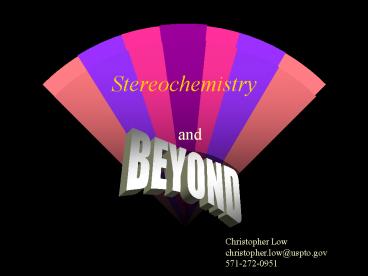Stereochemistry - PowerPoint PPT Presentation
Title:
Stereochemistry
Description:
Melting point is a physical property and inheres from the structure of the compound. ... forms which are significantly different in physical or chemical properties. ... – PowerPoint PPT presentation
Number of Views:74
Avg rating:3.0/5.0
Title: Stereochemistry
1
Stereochemistry
- and
BEYOND
Christopher Low christopher.low_at_uspto.gov 571-272-
0951
2
Example 1
- Application claims A compound of Formula X with
melting point y.
3
Prior art disclosure
- A compound of Formula X.
- (no melting point given)
4
Do we reject?
- Yes.
- Melting point is a physical property and inheres
from the structure of the compound. - Note other physical properties (e.g., optical
properties) are also inherent in the compound
itself.
5
Example 2
- Application claims A stereomer of Formula X.
6
Prior art discloses a biologically active
racemic mixture
7
Do we reject?
- Yes.
- Rejection is appropriate whether the stereomer is
isolated or not. - Subject to secondary considerations.
8
Example 3
- Application claims A stereomer of Formula X.
9
Prior art discloses a racemic mixturethere is
no motivation for resolution of the isomers
10
Do we reject?
- Yes.
- However, rejection may be overcome by limiting
the environment of the optically active compound - Rejection may not be overcome if limiting the
environment is taught in the prior art.
11
What is the environment of the compound?
- In a racemic mixture, the optically active
compound is mixed with its optical opposite. - Excluding the opposite isomer in applicants
claim makes the claim different from the racemate
in the art. - though it may not be patentably distinct
12
How can optical opposite be excluded?
- Can require isolation from all other species
- If they are enantiomers
- Can exclude the undesired enantiomer
- by requiring some degree of optical purity
- by reciting that the desired enantiomer is in x
enantiomeric excess (if supported by spec)
13
Enantiomeric Excess (ee)
- Means one enantiomer is present in a certain
amount over the other enantiomer - Results in optical activity of the composition
14
How ee is calculated
- ee is the difference between the relative
proportions of the two enantiomers. - A reaction or separation producing 93 of one
enantiomer and 7 of the other is said to produce
the desired enantiomer in 86ee.
15
Beyond Stereochemistry
- Limiting the environment
- essentially the compound claim is hybridized to
a composition claim - certain additional elements are excluded or
significantly reduced - When else is this technique useful?
- Chemical Purity
- Polymorphism
16
Chemical Purity
- Claims can be limited by
- a purity clause
- e.g., 99 and 44/100 percent pure
- exclusion of a specie or a genus
- e.g., free of alcohol
- function or property effective to eliminate a
specie or genus
17
Just like our stereochemistry example
- If a purity technique is used, then prior art
will be avoided if there is no motivation to have
excluded or reduced the identified element.
18
Polymorphism
- The existence of a substance in two or more
crystalline forms which are significantly
different in physical or chemical properties.
19
- Racemate
- Two stereoisomers present in a single
composition. - Stereoisomers are not patentable over their
racemate. - Unless the environment of the compound is
sufficiently limited.
- Polymorph
- Two (or more) crystals present in a single
composition. - Single crystals are not patentable over their
polymorph. - Unless the environment of the compound is
sufficiently limited.
20
When the art discloses a compound in a
composition and you want the compound alone...
- you can claim the compound as being free of the
other elements in the composition provided the
art is deplete of motivation to have separated
them.
21
Thank you
- Christopher Low
- Supervisor, Art Unit 1614
- 571-272-0951
- Christopher.low_at_uspto.gov

